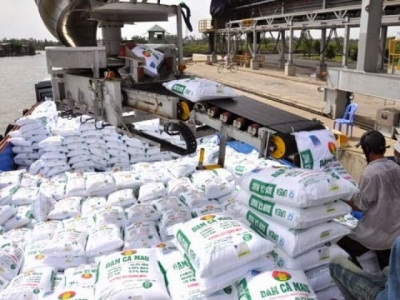Fertilizer enterprises propose for protection of domestic production

On 13th April 2017, the Competition Management Department (under the Ministry of Industry and Trade) issued a document to confirm the validity of enterprises’ dossiers in accordance with the provisions of the Law on safeguard.
Enterprises’s dossiers are defined in accordance with the provisions of the Law on safeguard by the Competition Management Department.
In early April 2017, the Competition Management Department received a number of enterprises’ dossiers to request protection of domestic production with the application of safeguard measures for a number of imported fertilizers products with HS code as follows: 3105.10 .10, 3105.10.20, 3105.10.90, 3105.20.00, 3105.30.00, 3105.40.00, 3105.51.00, 3105.59.00 and 3105.90.00.
Accordingly, the goods to be investigated include all inorganic or complex inorganic fertilizers with a major constituent of nitrogen and phosphorus (P2O5), with a nitrogen content of at least 7% and a P2O5 content of 30% or more.
The addition of other elements such as magnesium (calcium), calcium (Ca), sulfur (S), potassium (K) ... or other trace elements shall not change the physical and chemical characteristics as well as the purpose of the products. The addition of micronutrients is appropriate for each soil type and crop group.
In addition, imported goods are investigated regardless of colour.
Reportedly, the Competition Management Department (under the Ministry of Industry and Trade) issued a document to confirm the validity of enterprises’ dossiers in accordance with the provisions of the Law on safeguard.
In order to serve the process of reviewing and evaluating as well as initiating an investigation, ensuring the legitimate rights and interests of enterprises, the Competition Management Department has recommended domestic enterprises to manufacture fertilizer products with specifications as follows: business information; design capacity and production of fertilizer products in 2014, 2015 and 2016; company feedback on the case (agree, protest, no opinion); and any other document / evidence of enterprises related to the case.
The deadline for enterprises to provide the above information will be 5 pm on 24th April 2017.
Earlier, in October 2016, the Competition Management Department also reported to the Ministry of Industry and Trade on the possibility of applying preventive measures for urea and DAP imports. This agency has made specific analysis for urea and DAP imports based on data from the General Department of Vietnam Customs provided enterprises.
According to this agency, there is no legal basis to determine that the main cause of the serious deficit is due to imports. The urea businesses said that the main cause of the problem was the inadequacies in the VAT policy and the price of coal in the domestic market is higher than that in the global market.
For DAP, preliminary data showed that apart from the general difficulty of the VAT policy, a sharp increase in the volume and value of imports was also a cause of the deficit. Thus, the domestic industry is suffering severe and preliminary damage, which can be identified imports as the main cause.
In addition, there are only two DAP producers in Vietnam, so if there are no solutions to support these two companies, it will be difficult for DAP industry to compete imports from China. Thus, it is likely that China will dominate the market and push up fertilizer prices so that agricultural industry can not self-determine the price of products in the domestic market.
However, the proposal to apply trade remedies (if any) will directly affect farmers and prices of agricultural products. Thus, there should be cautious in the investigation of the application of safeguard measures against the DAP products.
According to the Competition Management Department's analysis, urea and DAP are currently being used to fertilize crops, helping plants to grow. The application of trade remedies may lead to an increase in input costs for agricultural production.
Related news
 Agricultural export highlights of 2016
Agricultural export highlights of 2016 Vietnam earned more than US$22 billion from agricultural and seafood exports in 2016, a 7.7 percent increase from 2015.
 Five measures proposed to save pig-farming industry
Five measures proposed to save pig-farming industry Over the recent months, the price of live pigs has been on the decrease, down to around USD1.3 per kilo
 Cheap imported fruits preferred over domestic products
Cheap imported fruits preferred over domestic products At large supermarket chains such as Big C and Vinmart, apples and pears from the US and France are quoted at a low VND40,000-90,000 per kilo.